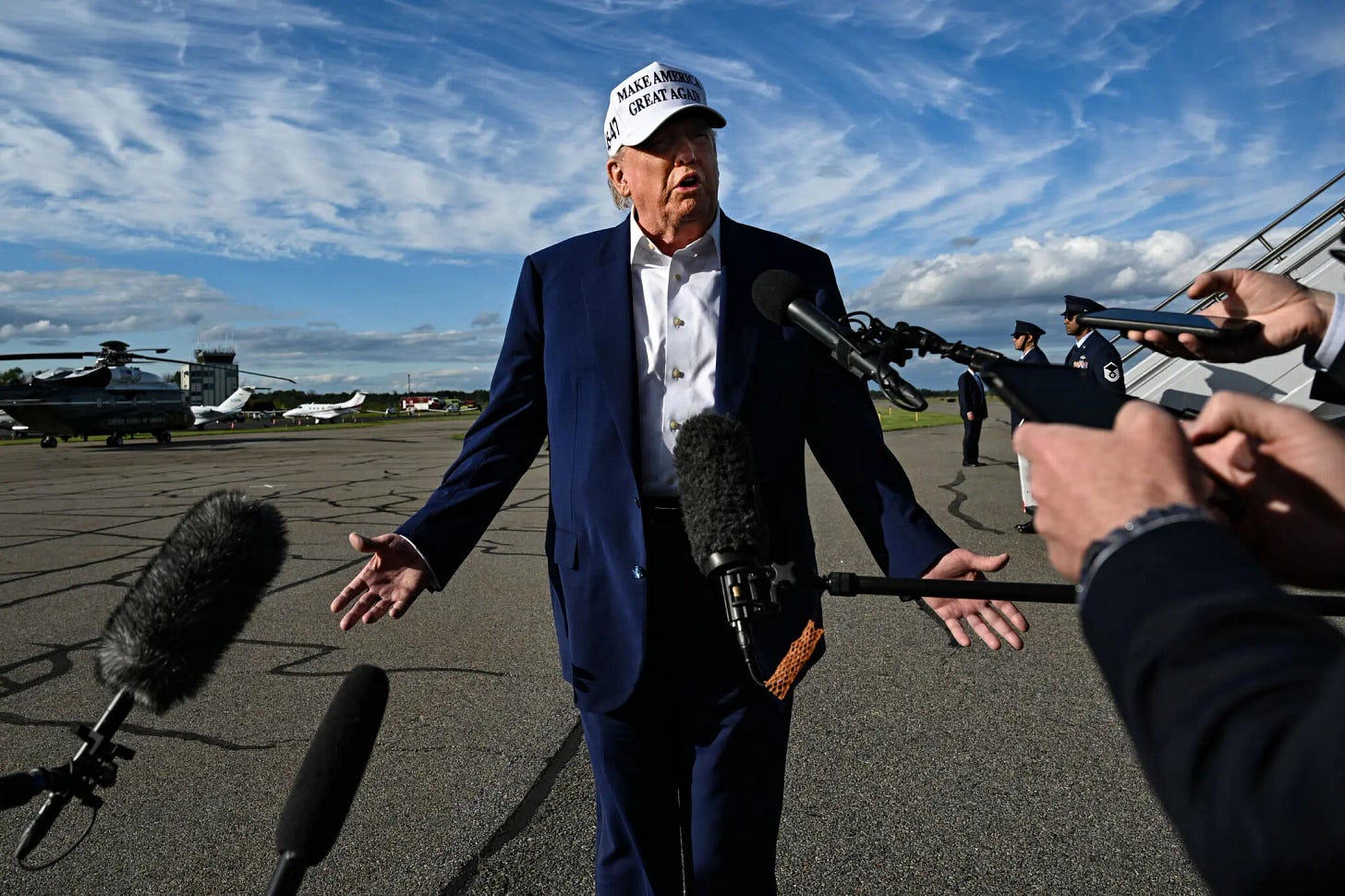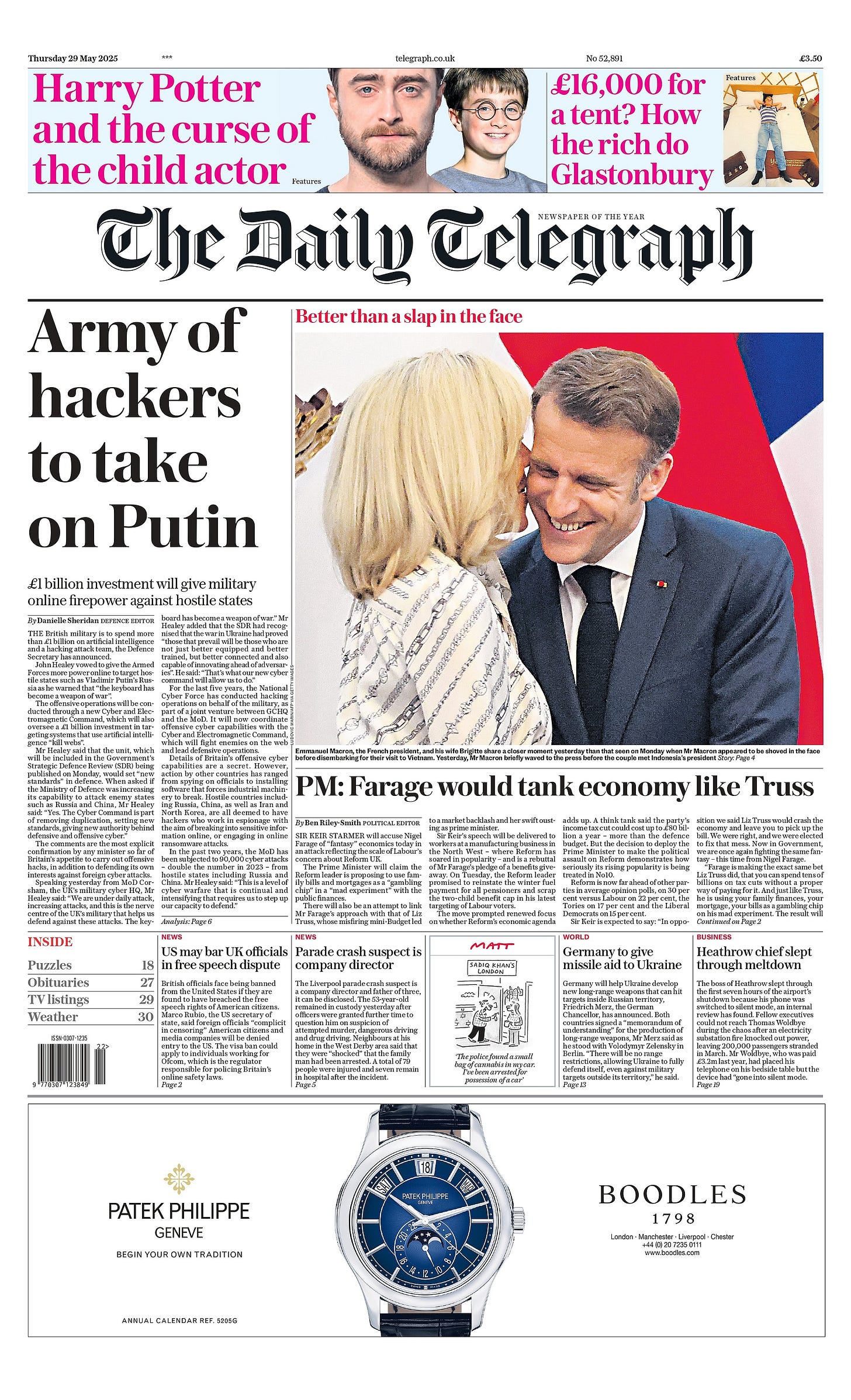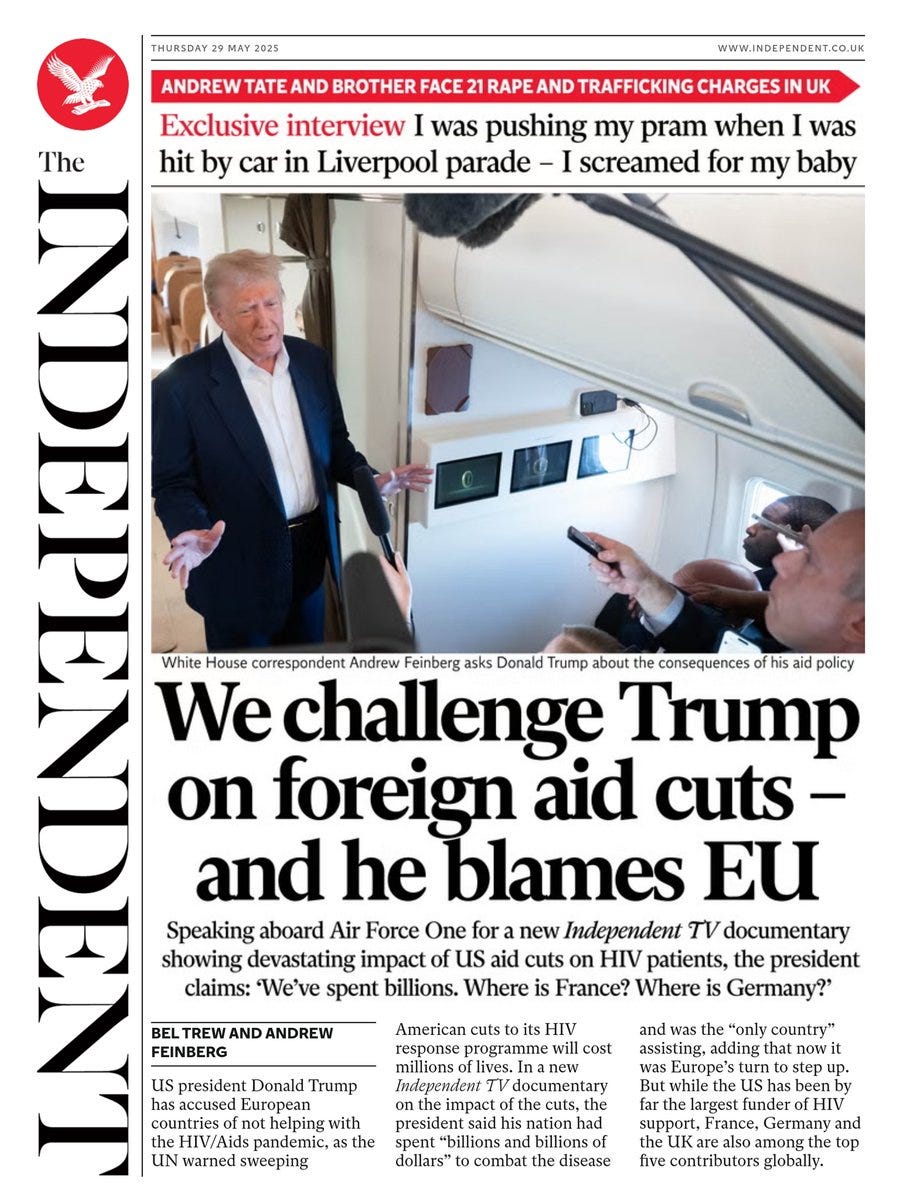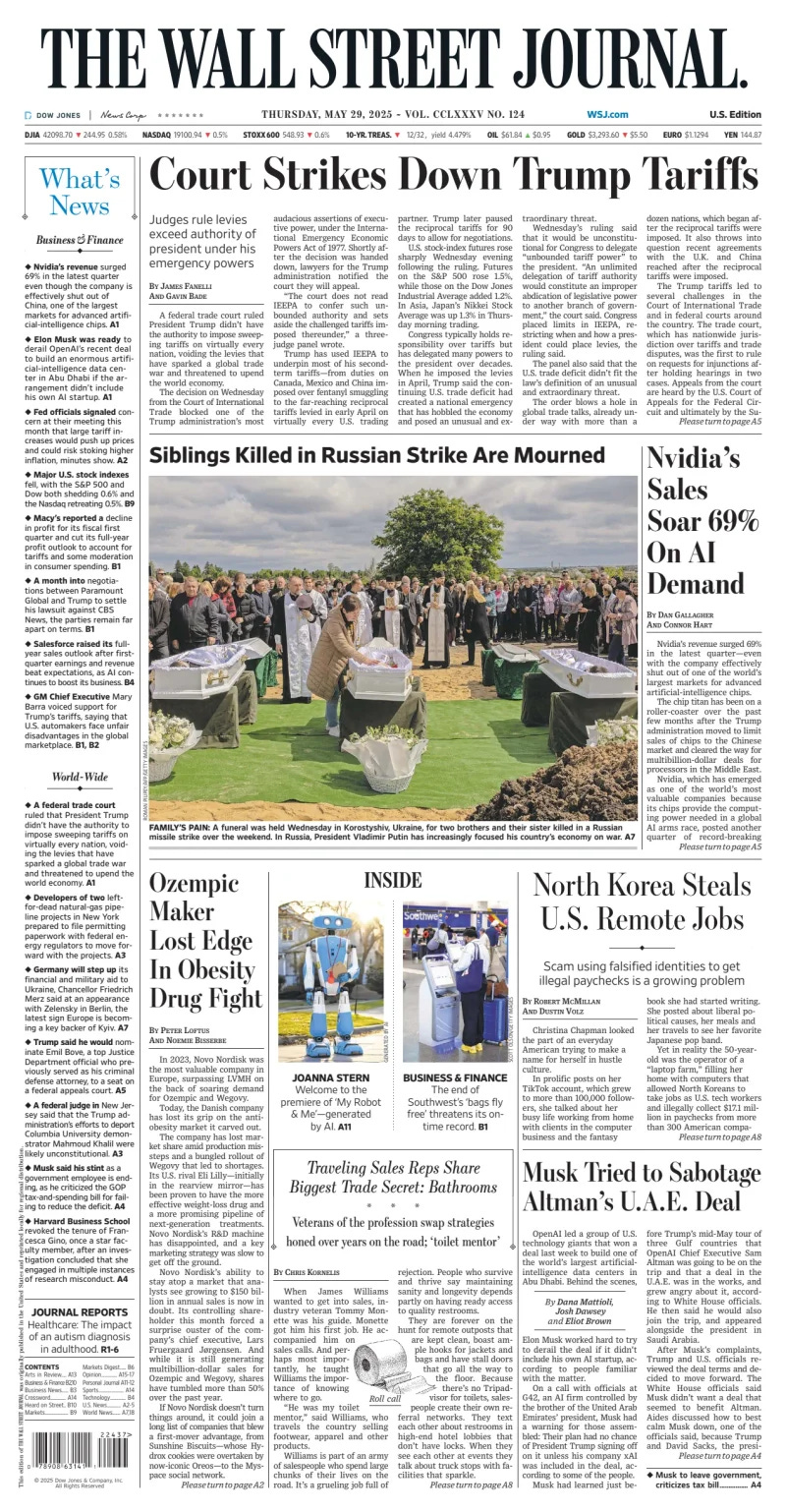Stunning Legal Rebuke Halts Trump’s Sweeping Tariff Plan
Federal judges rule president overstepped emergency powers in global trade crackdown, striking a blow to cornerstone of Trump’s economic agenda
Welcome to another edition of World Briefing, coming to you today from a state dramatically impacted by Russia’s full-scale invasion of Ukraine - Moldova. Remember, if you find value in what you’re reading, consider upgrading to a paid subscription. Your support fuels my mission to deliver sharp, independent reporting and analysis—and gives you access to exclusive content you won’t find anywhere else.
A panel of federal judges on Wednesday blocked President Trump from imposing some of his steepest tariffs on China and other U.S. trading partners, finding that federal law did not grant him “unbounded authority” to tax imports from nearly every country around the world. The ruling, by the U.S. Court of International Trade, delivered an early yet significant setback to Mr. Trump, undercutting his primary leverage as he looks to pressure other nations into striking trade deals more beneficial to the United States. Before Mr. Trump took office, no president had sought to invoke the International Emergency Economic Powers Act, a 1977 law, to impose tariffs on other nations. The law, which primarily concerns trade embargoes and sanctions, does not even mention tariffs. But Mr. Trump adopted a novel interpretation of its powers as he announced, and then suspended, high levies on scores of countries in April. He also used the law to impose tariffs on products from Canada and Mexico in return for what he said was their role in sending fentanyl to the United States. On Wednesday, the Court of International Trade, the primary federal legal body overseeing such matters, found that Mr. Trump’s tariffs “exceed any authority granted” to the president by the emergency powers law. Ruling in separate cases brought by states and businesses, a bipartisan panel of three judges essentially declared many, but not all, of Mr. Trump’s tariffs to have been issued illegally. It was not clear precisely when and how the tariff collections would grind to a halt. The ruling gave the executive branch up to 10 days to complete the bureaucratic process of ending them. The Trump administration immediately filed its plans to appeal in the U.S. Court of Appeals for the Federal Circuit. A White House spokesman, Kush Desai, sharply rebuked the court, saying in a statement that unfair trade relationships had “decimated American communities, left our workers behind and weakened our defense industrial base — facts that the court did not dispute.” - NYT
My hot take comment: An American insider — firmly within the Beltway bubble — reacted to the court challenge against Trump’s global tariff blitz by predicting it would be appealed all the way to the Supreme Court, where, in their view, justices loyal to the president are likely to side with him. A private American diplomat, echoing what other U.S. expatriates have confided to me, lamented the difficulty of watching the disintegration of the United States from afar — a collapse seemingly driven by actors intent on its undoing, armed with tools and strategies they’ve spent years perfecting. These Americans (and friends of America) also observe that the world has, in a remarkably short span, become a far more unstable place in the absence of credible U.S. leadership willing to engage globally. Several have agreed with me that the current India–Pakistan conflict likely wouldn’t have escalated this far had traditional U.S. diplomatic leadership still been active on the world stage.
The British military is to spend more than £1 billion on artificial intelligence and a hacking attack team, the Defence Secretary has announced. John Healey vowed to give the Armed Forces more power online to target hostile states such as Vladimir Putin’s Russia, as he warned that “the keyboard has become a weapon of war”. The offensive operations will be conducted through a new Cyber and Electromagnetic Command, which will also oversee a £1 billion investment in upgraded targeting systems using an artificial intelligence “kill web” that connects military systems. Mr Healey said that the command unit, which will be included in the Government’s Strategic Defence Review (SDR) being published on Monday, would set “new standards” in defence. When asked if the Ministry of Defence was increasing its capability to attack enemy states such as Russia and China, Mr Healey said: “Yes. The Cyber Command is part of removing duplication, setting new standards, giving new authority behind defensive and offensive cyber.” The comments are the most explicit confirmation by any minister so far of Britain’s appetite to carry out offensive hacks, in addition to defending its own interests against foreign cyber attacks. Speaking on Wednesday from MoD Corsham, the UK’s military cyber HQ, Mr Healey said: “We are under daily attack, increasing attacks, and this is the nerve centre of the UK’s military that helps us defend against these attacks. The keyboard has become a weapon of war.” Mr Healey added that the SDR had recognised that the war in Ukraine had proved “those that prevail will be those who are not just better equipped and better trained, but better connected and also capable of innovating ahead of adversaries”. He said: “That’s what our new cyber command will allow us to do.” For the last five years, the National Cyber Force has conducted hacking operations on behalf of the military, as part of a joint venture between GCHQ and the MoD. It will now coordinate offensive cyber capabilities with the new Cyber and Electromagnetic Command, which will fight enemies on the web and lead defensive operations. Details of Britain’s offensive cyber capabilities are a secret. However, action by other countries has ranged from spying on officials to installing software that forces industrial machinery to break. Hostile countries, including Russia, China, as well as Iran and North Korea, are all deemed to have hackers who work in espionage with the aim of breaking into sensitive information online, or engaging in online ransomware attacks. In the last two years, the MoD has been subjected to 90,000 cyber attacks – double the number in 2023 – from hostile states including Russia and China. Mr Healey said: “This is a level of cyber warfare that is continual and intensifying that requires us to step up our capacity to defend.” - The Telegraph
President Donald Trump shrugged off ethics and security concerns to accept a new luxury plane from Qatar—now he’s complaining about its size. “It’s too big,” Trump told reporters Wednesday. “Frankly it’s too big, much too big.” He nonetheless touted the jet as “beautiful, big” and “magnificent,” offering no further explanation for his issue. Measuring 250 feet long, the Boeing 747-8 indeed stretches 18 feet beyond the older Boeing 747-200B that currently serves as Air Force One, according to The Guardian. But the $400 million gift from Qatar’s royal family, dubbed a “flying palace,” would seem to suit Trump’s taste for the grandiose just fine. According to an “aircraft specification summary” document posted online when the plane was listed for sale several years ago, it has at least three lounges, two bedrooms, nine bathrooms, five galleys and a private office. The art-deco inspired interiors feature oversized couches and recliners, wood paneling, built-in bookshelves, and big-screen TVs. Moreover, one reason Trump apparently wanted the new plane so badly is that the size of the current Air Force One made him feel insecure when parked next to jets owned by Middle Eastern royals. “When you land and you see Saudi Arabia, and you see UAE, and you see Qatar, and you see all this, and they have these brand new Boeing 747s mostly, and you see ours next to it, this is like a totally different plane,” Trump told Fox News’ Sean Hannity. While Trump boasted Wednesday that he got the plane for “free,” Fortune reported that modifying the jet may cost taxpayers up to $1 billion. And at the end of Trump’s term, the jet won’t stay in service—instead it will be transferred to Trump’s presidential library foundation - Daily Beast
South Africa-born billionaire Elon Musk announced overnight on Thursday he has left his role as a top adviser to US President Donald Trump after some five months at the helm of the newly created Department of Government Efficiency (DOGE). In a post on his platform X, Musk thanked the US president for the chance to lead DOGE, an initiative Trump authorised through an executive order on his first day in office."As my scheduled time as a Special Government Employee comes to an end, I would like to thank President Donald Trump for the opportunity to reduce wasteful spending," Musk wrote on X.
"The DOGE mission will only strengthen over time as it becomes a way of life throughout the government," he added. Musk announced his decision one day after CBS released part of an interview in which he criticised Trump’s legislative agenda by saying he was “disappointed” by what the president calls his “Big Beautiful Bill.” The legislation includes a mix of tax cuts and enhanced immigration enforcement. Musk described it as a “massive spending bill” that increases the federal deficit and “undermines the work” of his Department of Government Efficiency, known as DOGE. “I think a bill can be big or it could be beautiful,” Musk said. “But I don’t know if it could be both.” - Euronews
US Secretary of State Marco Rubio said on Wednesday that the United States will start “aggressively” revoking visas issued to Chinese students, and will “enhance scrutiny” of applications from mainland China and Hong Kong. “Under President [Donald] Trump’s leadership, the US State Department will work with the Department of Homeland Security to aggressively revoke visas for Chinese students, including those with connections to the Chinese Communist Party or studying in critical fields,” he said in a statement. “We will also revise visa criteria to enhance scrutiny of all future visa applications from the People’s Republic of China and Hong Kong,” the statement added - SCMP
Poland’s halting effort to restore the rule of law and fully return to the EU mainstream will be decided in Sunday’s presidential vote. Liberal Warsaw Mayor Rafał Trzaskowski, backed by Prime Minister Donald Tusk, is neck-and-neck with right-winger Karol Nawrocki, supported by the populist-nationalist Law and Justice (PiS) opposition party. If Trzaskowski wins, he promises to speed up efforts to restore the rule of law, currently stalled by PiS-aligned incumbent President Andrzej Duda. But a Nawrocki victory would block Tusk’s government for the remainder of its term. Sunday’s outcome means either a clean break with Poland’s past as one of the bad boys of the EU, or a return to a more turbulent relationship with Brussels. When PiS was in power from 2015 to 2023, Warsaw tangled with the EU over its tough abortion laws, freedom of speech, clampdowns on LGBTQ+ rights, corruption, and backsliding on the rule of law. Tusk’s 2023 victory ended many of those tensions, a process that would be finalized with a Trzaskowski win. If Nawrocki becomes president, however, Tusk will have a very difficult time clearing the agenda of the difficulties of the past. Tusk’s people blame the slow pace of change on Duda — highlighting the need for a change of president. “We haven’t delivered on rule of law, that’s right. The responsibility lies with the man currently residing in the presidential palace,” Paweł Śliz, an MP for the Third Way, one of Tusk’s coalition allies and the head of the parliamentary Justice and Human Rights Committee, told POLITICO. Under Tusk, Poland is back as one of the leading countries in the EU, setting the bloc’s direction alongside Germany and France. But his core promise of undoing the legal changes pushed through by PiS in the eight years it ruled Poland has fallen flat. “There is really nothing more important for a modern nation than a set of rights and duties recognized as common, without exception,” Tusk told the parliament in his inaugural address as Poland’s new prime minister in December 2023 - Politico
Attempts to tell Heathrow airport's sleeping chief executive that the airport had been closed because of a power outage failed because his bedside phone was on silent, an inquiry has found. Thomas Woldbye was in bed as senior Heathrow staff decided to suspend operations because of a fire at a nearby electrical substation. No flights operated at the west London airport until about 18:00 GMT on 21 March because of the blaze which started late the previous night. The closure, which affected 270,000 journeys, was caused by "an unprecedented set of circumstances", Heathrow chairman Lord Deighton said, adding the airport's infrastructure will be made "more fit for the future". Heathrow commissioned the inquiry into what happened, led by former transport secretary Ruth Kelly, who is an independent member of the airport's board. The Kelly Review found that Mr Woldbye "was not involved" in the decision taken by the airport's chief operating officer Javier Echave at 01:15 on 21 March to suspend operations until 23:59. Alerts known as F24 alarms were sent to Mr Woldbye's mobile at 00:21 and 01:52 to activate emergency procedures, and Mr Echave tried to call him several times. The report stated: "Mr Woldbye first became aware of the incident at approximately 06:45 on 21 March, and received a debrief from Mr Echave." Mr Woldbye expressed "his deep regret at not being contactable during the night of the incident", the review said. The review recommended that Heathrow considers having a "second means of contact" to notify key individuals about critical incidents. The Sunday Times first reported that Mr Woldbye slept as the major disruption unfolded on 21 March - BBC






